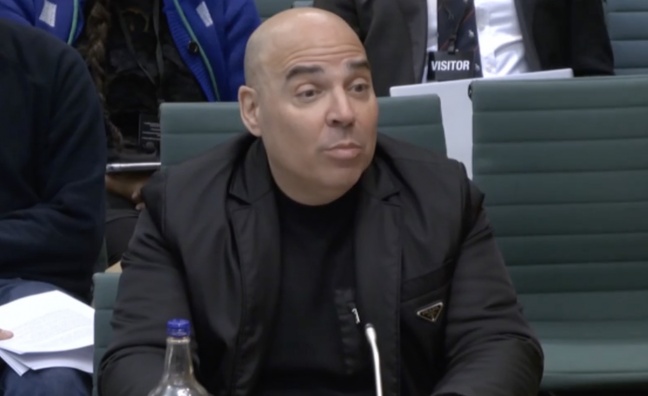MPs on the Culture, Media & Sport Select Committee have once again turned to the economics of streaming with a progress report session.
High-profile speakers giving evidence today included Merck Mercuriadis, CEO & co-founder of Hipgnosis Song Managment, along with Nile Rodgers and VV Brown, as well as Music Publishers Association CEO Paul Clements and academics Professor David Hesmondhalgh and Dr Hyojung Sun.
Much of the focus was on the split between recorded music artists and songwriters, with the share of royalties at roughly 55% for recording and 15% for publishing after the 30% deduction by DSPs.
The pairing of Mercuriadis and Rodgers was a chance for them to reflect on the new, data-driven paradigm for music in which songwriters now play an even more vital role in creating hits for artists. And while they welcomed the opportunities from streaming, there remains disquiet about how the model is working for creators.
Mercuriadis referred to the Competition & Markets Authority’s decision a year ago to set up working groups rather than more far-reaching policy interventions.
“That was a missed opportunity and I suppose the reason why it was a missed opportunity is because… streaming is good value for the consumer, and streaming has absolutely changed the music industry,” Mercuriadis told MPs. “You can look an 18-year-old person in the eyes today and say the best days of the music industry are in front of it, this is a great industry to be in. But it’s not a great industry yet for songwriters and for artists, as it is relative to how great an industry it is for recorded music companies.”
Paul Clements, MPA CEO, defended the major publishers against suggestions by MP Kevin Brennan that it was not in their corporate groups’ interests to push for increased publishing royalty rates from streaming at the expense of recorded music income.
“My experience – and I had 22 years at PRS For Music and five years at the Music Publishers Association – is that the influence the majors have had has been a positive one,” said Clements. “The majors drove up that rate through their bilateral negotiations with platforms from the 7-8% that the tribunal in the UK left us with… The bottom line is that those major publishers have helped us, thankfully, drive that rate up. As the tide has risen, everybody else’s rates have increased – and there is a real misunderstanding about how that has worked.”
As the hearing was taking place, the Council Of Music Makers – which brings together representative UK organisations for artists, songwriters and composers, musicians, music producers and music managers – raised concerns that promised reforms of the music streaming market have stalled.
The Council Of Music Makers, which consists of the Ivors Academy, the Featured Artists Coalition, the Music Managers Forum, the Music Producers Guild and the Musicians’ Union, said in a statement: “It’s been over two years since the CMS Select Committee called for a complete reset of the UK’s music streaming business to address a wide range of market dysfunctions. Their groundbreaking report brought the entire industry to the table for the first time.
“However, despite some progress on improving data and transparency, the most contentious issues around music maker remuneration are yet to be explored. This is an intolerable situation for the UK’s artists, songwriters, musicians and producers. We urgently need MPs and the government to help get industry discussions back on track, so that together we can deliver solutions in 2024.”
The UK government previously told the music industry to find voluntary solutions around transparency, metadata and remuneration. A group of industry representatives was tasked with addressing these issues at the Intellectual Property Office.
Despite the establishment of pan-industry codes on metadata (published in May) and transparency (set to be launched in the new year), the CMM is concerned that a working group to explore reforms of how music makers get paid is still to meet.
The organisation also voiced its frustration that major labels have embarked on their own streaming reform programmes.
During the parliamentary session, Nile Rodgers focused on the value of the songwriter and development of talent.
“We have said this many times before but it’s important to keep repeating it until change takes place,” he said in a statement ahead of the hearing. “There is no music industry of any kind without the songwriter being there first. They are the catalyst for every aspect of the industry yet they are the lowest paid. At a point in time where there has never been greater consumption of music or profits, thanks to the streaming economy, the importance of the songwriter must be reflected in higher remuneration.”
VV Brown added: "Snoop Dogg shared his 2023 Spotify Wrapped, revealing his publisher’s words that a billion streams generated just $45,000 in income. If we can't discern the issue here, then the world seems truly inverted. As an artist, I must find ways to leverage my platform for change whether it be small or big."










